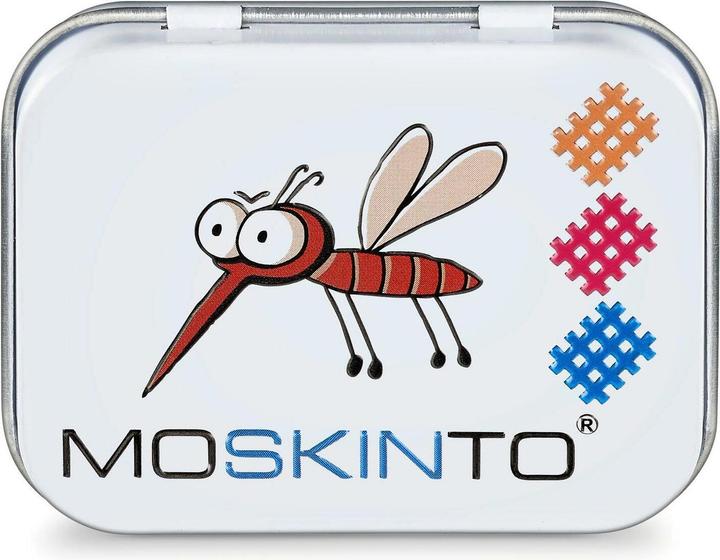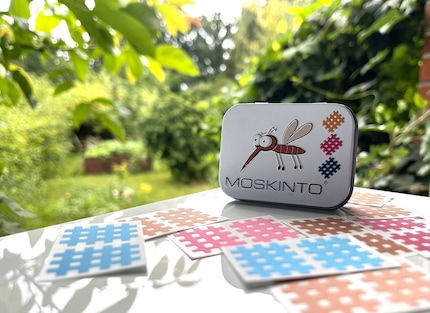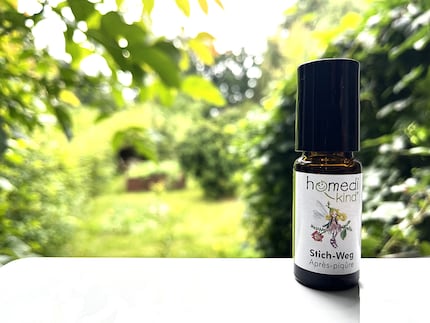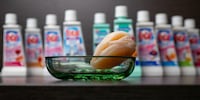

Saliva, toothpaste or plasters: what really works on itchy mosquito bites?
Have you ever spat on a mosquito bite in an emergency? Read on to find out whether it really helps, or whether toothpaste, a heat pen or essential oils are a better option. Plus, I share my two gentle favourites for persistent itching.
As lovely as spending summer outdoors is, those unavoidable, itchy mosquito bites can be a nightmare. But you shouldn’t let them spoil the warm season for you.
Basic strategies to combat itching
There are several different ways to deal with itching – some more effective than others:
Cooling: cold compresses or cold packs constrict blood vessels, inhibit histamine release and numb nerves. This relieves both itching and swelling.
Heat: electronic heat pens can denature the proteins in mosquito saliva that would otherwise trigger itching. This stops the itching, although the heat can be briefly painful.
Antihistamines: these active ingredients specifically block the effects of histamine, relieving itching, swelling or redness. Ointments or gels suppress the effects of histamine locally, while tablets help with more severe reactions.
Mechanical methods: special plasters lift the skin slightly as a distraction from the itching. Similar to kinesiology tape – which is used in pain management – the grid-like structure ensures the nerve impulses are altered. This can reduce the itching, and the plasters provide a physical barrier to stop you scratching.
Fact check: home remedies and myths
There are countless home remedy recommendations for itching. Is it really worth spitting on the bite or covering it with toothpaste, as I so enthusiastically did as a child? Time for a quick fact check:
**Saliva contains enzymes, but it has no proven effect on itching. So, it’s a thumbs down when it comes to helping with mosquito bites. I was also wrong about my toothpaste remedy and probably benefited more from the placebo effect. Not only is there no scientific evidence that it helps, toothpaste can irritate the skin further.
All-round household staple onions are different: their sulphur compounds have antibacterial properties, cool the skin and can actually relieve itching. Vinegar also makes a difference with its cooling and anti-inflammatory properties. But who wants to constantly smell of onions or vinegar? Aloe vera’s skin-soothing effect is even better. It relieves itching and is considered minimally irritating. The benefits of cooling – for example, using a cold compress – and heat have been clearly proven scientifically. Both methods reduce itching and swelling, with heat even being able to destroy the proteins in mosquito saliva.
My test results: two gentle favourites
Moskinto insect bite patch
You apply the small, grid-shaped patch directly to a mosquito bite. It works without medication or active ingredients. However, I was initially sceptical about how a patch without active ingredients could work. Until I understood the idea behind it: the special pattern slightly lifts the top layer of skin. This essentially confuses your nerves, so the itching often subsides significantly after a short time.

Source: Anna Sandner
I noticed a noticeable improvement after just a few minutes. The plaster can be left on the skin for several days to prevent any itching returning. The plasters have the considerable benefit of preventing scratching, especially for children. My son also liked the eye-catching design coupled with the feeling of actually «treating» the bite.
Even though there are no large-scale clinical studies on its effectiveness, my everyday test was convincing. Especially when it came to sparing my son (and me) the misery of constant itching. He won’t let ointments, creams («Yuck, gross!») or even painful heat sticks («Ouch, take it away!») anywhere near him. But he willingly sticks the colourful mesh bandages on even the smallest bite.

Homedi Kind stich-weg roll-on
While my son has found his remedy of choice in the Moskinto patches, I’m particularly fond of the Homedi Kind roll-on. Originally designed for children, it's my new miracle cure for skin irritations.

Source: Anna Sandner
The natural ingredients such as eucalyptus oil, lavender and jojoba oil not only smell good; in my experience, they actually relieve itching. The oils are known for their skin-soothing and anti-inflammatory properties, are well-researched and are considered skin-friendly. All you do is apply the roll-on to the bite to deliver a pleasant cooling sensation. According to the manufacturer, the combination of oils has a decongestant and nourishing effect – which I can confirm after using it for the second summer.
The ultimate remedy, to be on the safe side
Ultimately, the most effective way to relieve itching after a mosquito bite is extreme temperatures. Cooling and heat treatments have been scientifically tested and proven to be effective. The same goes for antihistamines. Home remedies such as onions, vinegar or aloe vera can help. Toothpaste and saliva, on the other hand, are more on the myth side. I particularly like the gentle alternatives including plasters and roll-ons. They make sure scratching doesn’t turn into a summer hobby in the first place.
Science editor and biologist. I love animals and am fascinated by plants, their abilities and everything you can do with them. That's why my favourite place is always the outdoors - somewhere in nature, preferably in my wild garden.
Practical solutions for everyday problems with technology, household hacks and much more.
Show all


